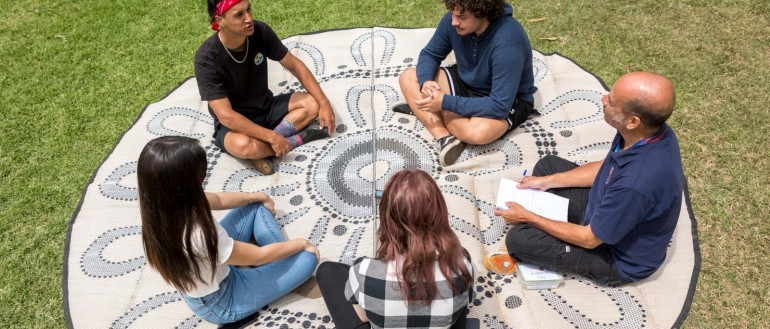A new research program focused on finding out wellbeing measures across the life course for Aboriginal and Torres Strait Islander children, youth and adults is highlighting the importance of culture.
The What Matters Wellbeing Research Program (What Matters), is working to develop measures of wellbeing specifically for Aboriginal and Torres Strait Islander children, youth and adults. These measures highlight that wellbeing is culturally bound and changes across the life course.
What Matters is currently running two projects, with a third in the pipeline. Each project is focused on developing a wellbeing measure for a distinct age group. For example, the What Matters team is in the final stages of developing the What Matters to Adults (WM2Adults) measure, a wellbeing measure for Aboriginal and Torres Strait Islander adults as part of the WM2Adults project.
The development of the WM2Adults measure has taken into account the views, experiences and preferences of 1325 Aboriginal and Torres Strait Islander adults across Australia and includes 32 strength-based items across 12 dimensions.
The team is currently running a large survey to determine what value people place on the 32 different strength-based items to enable the team to create meaningful wellbeing measures for Aboriginal and Torres Strait Islander adults. The WM2Adults wellbeing measure, called the Fabric of Indigenous Wellbeing model, will be complete and available for use across a variety of settings after June 2021.
The Fabric of Indigenous Wellbeing model highlights the interconnected nature of the parts of life that make up wellbeing for Aboriginal and Torres Strait Islander adults, such as family, community and culture.
This year the What Matters team has been preparing for the start of the What Matters 2 Youth (WM2Youth) project. The team conducted an Online Yarning Circles (OYCs) pilot study to evaluate the effectiveness of OYCs as an alternative to face-to-face interviews with young Aboriginal and Torres Strait Islander people amidst the COVID-19 pandemic. The findings of this pilot study will be published in a journal article in the coming months.
Menzies researchers (Professor Gail Garvey, Dr Kate Anderson, Dr Tamara Butler, Brian Arley and Alana Gall) trained and supported young Menzies staff and trainees (Elisha Clements-Anderson, Caitlin Wharton, Zyana Gall, Lauren Seden and Jamal Mitchell) to facilitate a total of 11 OYCs with 21 young Aboriginal and Torres Strait Islander participants from around Australia and ask what matters to them and their wellbeing.
What Matters project manager Dr Kate Anderson says that restrictions arising from the COVID-19 pandemic has led to innovative, new ways of working with young people.
“While we were initially looking to test a method of conducting our field work in the face of the COVID-19 restrictions, the findings of our pilot study suggest that web conferencing technologies might offer good longer-term solutions for engaging with Aboriginal and Torres Strait Islander young people,” Dr Anderson said.
“We found that being online gave the young participants a sense of greater control to adjust their level of engagement with the research, and many participants reported that they felt more comfortable participating in research via web conferencing than having to turn up to a face-to-face session.”
OYCs will be a key component of the WM2Youth project, which will begin in 2021 and focus on young people aged 12-17 years.
The What Matters 2 Kids (WM2Kids) project is in preparation and the team is planning to test and use innovative methods to include the voices of children in research.
For more information about our What Matters Wellbeing Research Program, please email Dr Kate Anderson - kate.anderson@menzies.edu.au.

